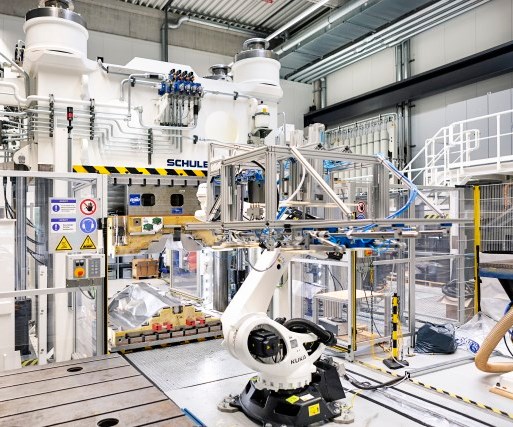Research project claims CFRP part production at half cost, faster throughput
The iComposite 4.0 project, led by Schuler AG and its partners, has tested its new production process with carbon fiber-reinforced plastic automotive prototype parts.

Source | Schuler AG
In a recent research project called “iComposite 4.0,” Schuler AG (Göppingen, Germany) and its partners report the production of a carbon fiber-reinforced plastic (CFRP) prototype part that achieves 50% reduced costs and 40% faster throughput times than conventional automotive composite materials.
The reference component is a floor plate mounted under the engine and passenger compartment of an English sports car. Design specifications included a structure that must be designed for frontal impact, high torsional stiffness and seat load. Schuler reports that while the costs for conventional production of that part would amount to almost 400 euros ($443.00) per part, the iComposite 4.0 prototype part was produced using about 150 euros ($166.44), and throughput times were reduced from 73 to 46 minutes.
In the first production step, performed by the RWTH Aachen Institute of Plastics Processing (Aachen, Germany), a robot sprays the basic structure of short glass fibers. Next, an algorithm, developed by the Aachen Center for Integrative Lightweight Construction (AZL) and Teijin Carbon (Wuppertal, Germany), calculates the individual tensile strength. Depending on this, another robot then lays the carbon fiber towpregs in a process, created by Siemens (Munich, Germany) and Broetje Automation Composites (Rastede, Germany), that compensates for component variations. The optical control is performed by a 3D measuring system from Apodius (Aachen, Germany).
Resin is then injected into the resulting composite fiber mat. The resin hardens under the high pressure of the hydraulic Schuler press, which forms the part at the end. Die technology from Frimo (Wixom, Mich., U.S.) also influences this process. For the desired wall thickness, the press can directly impact the deflection of the die. This makes it possible to produce good parts right from the start, the rejection rate is reduced to zero.
Schuler reports that the iComposite 4.0 process produces no waste, completely using up the required material, while also decreases throughput time and increasing output.
In addition, an integrated RFID chip from ID-Systec is said to ensure traceability of the production data. As a result, all components of the iComposite 4.0 production line that runs at the RWTH Aachen AZL are cross-linked to each other. The next step, Schuler says, is to incorporate the findings of the research project into industrial practice.
Related Content
-
DITF oriented rCF tapes target virgin fiber CFRP substitution
Infinity project developed highly oriented rCF/PA6 tapes with 88% the tensile strength, modulus of a virgin CFRP product and 49-66% reduction in global warming potential.
-
Carbon fiber, bionic design achieve peak performance in race-ready production vehicle
Porsche worked with Action Composites to design and manufacture an innovative carbon fiber safety cage option to lightweight one of its series race vehicles, built in a one-shot compression molding process.
-
“Structured air” TPS safeguards composite structures
Powered by an 85% air/15% pure polyimide aerogel, Blueshift’s novel material system protects structures during transient thermal events from -200°C to beyond 2400°C for rockets, battery boxes and more.

.jpg;width=70;height=70;mode=crop)














